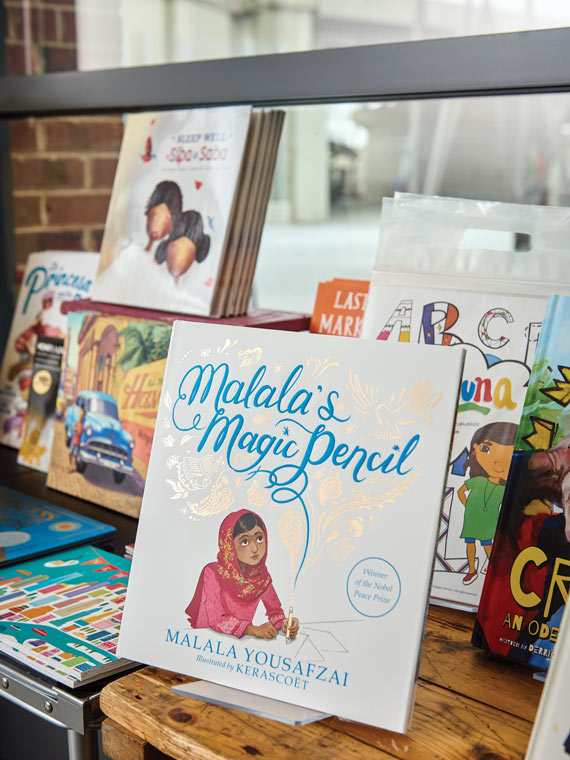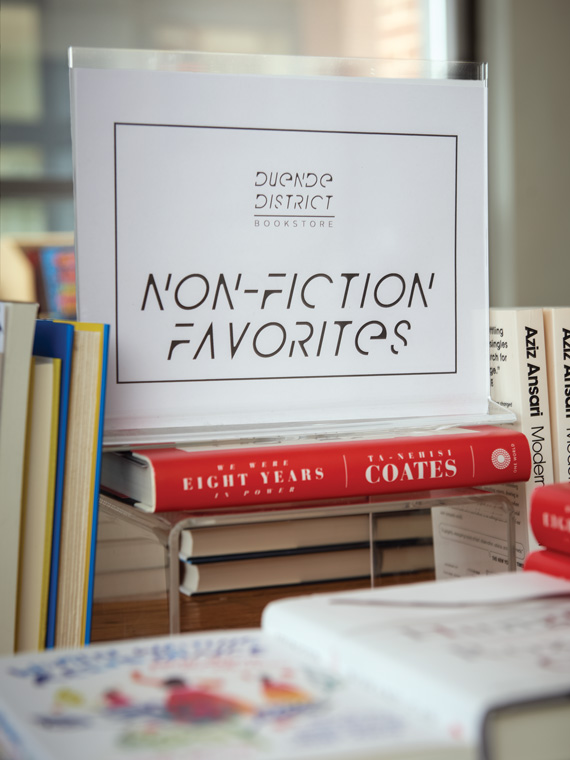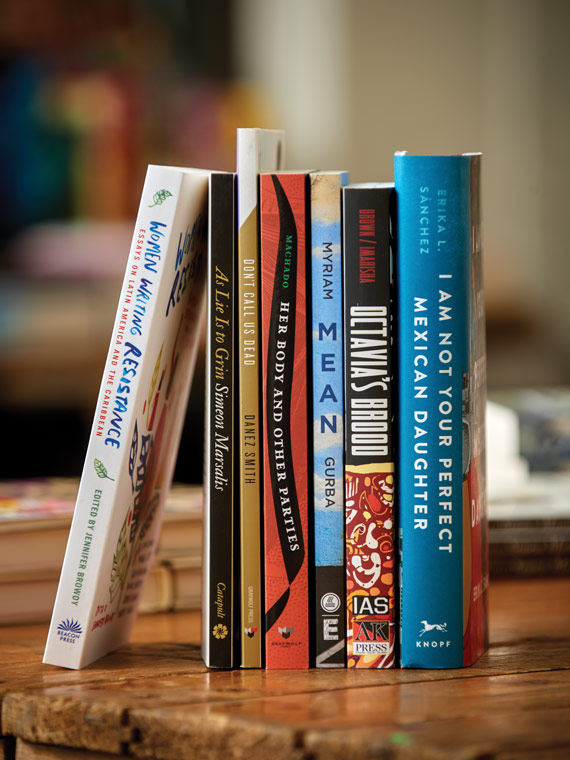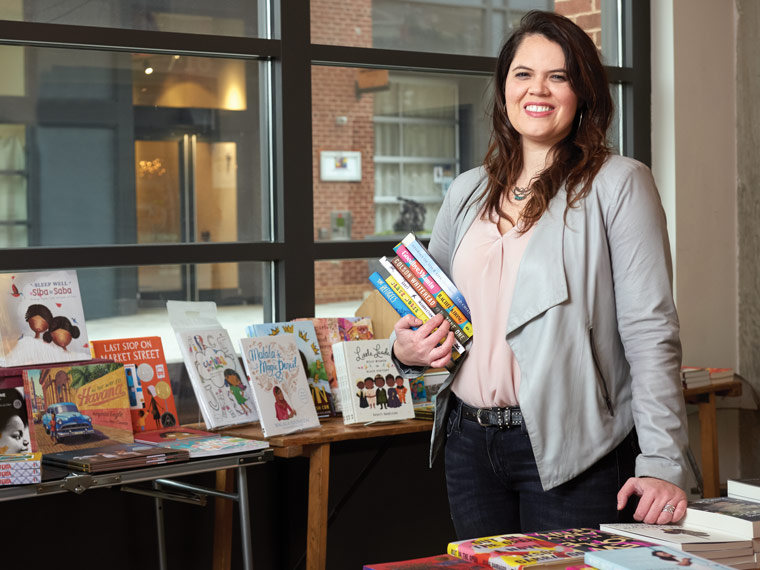A bookstore built by and for people of color where all are welcome, Duende District was born the last time I had my whiteness stripped from me.
As a career bookseller, I have worked in almost every kind of bookstore, from the long-closed Waldenbooks in Albuquerque to an up-and-coming SoHo indie bookstore in New York City, to a large, prominent indie bookstore in Washington, DC. (I even did a stint at the Sarah Lawrence bookstore the first year of my grad program.) I have embraced—and sold—the idea that a bookstore is a safe space for all people.
That is, of course, how independent bookstores market themselves, both intellectually and physically. Indie bookstores are a “Third Place,” your home away from home and work, where you browse titles in cozy solitude or engage with your community and sometimes even your favorite authors. Where you can bring your children and savor a cup of coffee as they pluck picture books from the shelves and settle onto a carpeted floor to turn pages with wonder.
 It has always been my dream to be a part of creating that wonderful, enriching bookstore experience, not only for the customers and community, but also for the staff, who share a genuine love of book culture—and often work for barely minimum wage. Just like poetry and writing, bookselling has been in my blood since childhood. I loved my family’s Sunday trips to the bookstore where we dispersed to our favorite sections for hours, then met at the registers to share our selections.
It has always been my dream to be a part of creating that wonderful, enriching bookstore experience, not only for the customers and community, but also for the staff, who share a genuine love of book culture—and often work for barely minimum wage. Just like poetry and writing, bookselling has been in my blood since childhood. I loved my family’s Sunday trips to the bookstore where we dispersed to our favorite sections for hours, then met at the registers to share our selections.
But my veins also flow hot with the tropics, with the blood of Panama and Puerto Rico, though my skin is a shade of brown so pale it’s barely noticeable—until it is.
“In my first workshop at Sarah Lawrence, we all became obsessed with In Search of Duende by Federico Garcia Lorca, who describes duende as ‘a momentary burst of inspiration, the blush of all that is truly alive. …’”
I am not white, but all of us who are light-skinned are taught to strive for whiteness by every institution we pass through, even though it is ultimately unattainable. To exist in the cracks and be grateful for the privilege our pale skin provides. The unspoken rule, ironically, is to keep silent and play along.
So when I attended a brainstorming meeting for the annual, nationwide Banned Books Week campaign, with “diversity” as the selected topic for the upcoming year, it was strange how deeply it struck me that I was the only person of color in a room of 10 people planning an event for a large community of color—specifically African American.
 When asked to share their thoughts, everyone stared at their feet. But I, like a good, workshop-trained writer, threw out ideas (such as “What about Arizona? They literally banned all books by Hispanic authors.”). All of my proposals were met with silence. I finally offered one last exasperated suggestion: “What if we assemble a panel of authors from different backgrounds: Latino, Asian American, African American, LGBTQ … ?”
When asked to share their thoughts, everyone stared at their feet. But I, like a good, workshop-trained writer, threw out ideas (such as “What about Arizona? They literally banned all books by Hispanic authors.”). All of my proposals were met with silence. I finally offered one last exasperated suggestion: “What if we assemble a panel of authors from different backgrounds: Latino, Asian American, African American, LGBTQ … ?”
I was suddenly cut off by one of the bookstore owners, who tossed out the offhand comment that unmade me: “I think we’re tired of hearing from categories of people on panels.” Just like that, my voice—and every minority voice—was casually nullified yet again.
There was no conscious intent by this person to erase our presence and voices, but what was said reflects the luxury of deep privilege that comes from money—and the common belief that we are living in a “post-racial” world.
To not “see color” celebrates the erasure of who and what we are across every part of our society. To not “see color” is a choice and privilege that people of color do not have. It is a divisive fallacy that has eroded the already fractured foundations of our democracy these past 30 years, culminating in the 2016 presidential election.
To perpetuate the idea that we live in a post-racial era upholds institutional racism everywhere, from local and federal government to schools, from board rooms to movie studios, from nonprofit organizations to publishing companies and bookstores.
 Throughout that meeting, I knew it was my job to remain silent and return to the sales floor, to my team of booksellers—a handful of whom were people of color—and act like nothing had happened. Again.
Throughout that meeting, I knew it was my job to remain silent and return to the sales floor, to my team of booksellers—a handful of whom were people of color—and act like nothing had happened. Again.
Yet, as I left the office that afternoon, I felt a finality settle into my entire body that I first mistook as anger. Months later, I realized it was actually a revolution. That very day, I decided not only to shut the door on working in spaces never intended to be shared with me or any people of color, but also to create a door to an entirely new space.
I decided to create a bookstore where we recognize, uplift, and celebrate our different cultures, backgrounds, skin colors, and communities. Because it is time for a new bookstore for a new world.
Written by Angela Maria (Williams) Spring MFA ’09
Photography by Mike Morgan
Duende District currently partners with venues around DC to offer pop-up bookstores and events designed to engage communities of color. Spring envisions expanding Duende’s reach nationally and opening small bricks-and-mortar shops as well.
